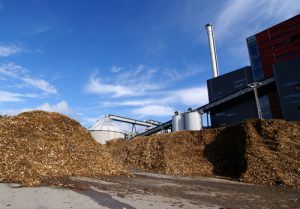
U.S. Sen. Susan Collins (R-ME) has unveiled the bipartisan Community Wood Energy Innovation Act of 2018, S. 2790, to incentivize companies across the United States to remove and repurpose low-grade and low-value wood.
“Our bill to reauthorize the Community Wood Energy Program supports the adoption of wood energy systems and helps grow the market for low-grade, low-value wood that landowners routinely remove to promote healthy forests,” said Sen. Collins, the original cosponsor of S. 2790, which U.S. Sen. Jeanne Shaheen (D-NH) introduced on April 26.
The bill would reauthorize the Community Wood Energy Program, which expires at year’s end, a competitive grant program that helps state and local governments foot the costs of installing high-efficiency, biomass-fueled energy systems, according to Sen. Collins’ office.
“Woody biomass is a cost-effective, renewable and environmentally friendly source of energy that creates jobs here in New England,” said Sen. Collins, adding that S. 2790, if enacted, “would spur new economic activity and protect our beautiful forests in Maine and across the country.”
Specifically, S. 2790 would amend the Farm Security and Rural Investment Act of 2002 to require the U.S. Secretary of Agriculture to establish a community wood energy and wood innovation program, and for other purposes, according to a congressional record summary.
For instance, to establish markets for low-grade wood, provisions under the bill would expand program eligibility to private entities and provide $25 million in annual matching grants to support capital investment in the facilities and systems that use such materials, according Sen. Collins’ staff.
Additionally, S. 2790 would prioritize projects in areas having heavily impacted local forests, as well as areas that could use low-grade wood for advanced wood heating, the senator’s staff said in a May 2 statement.
“Low-grade timber markets in New England are struggling, placing a significant strain on family-owned lumber mills and New Hampshire forest owners, big and small,” said Sen. Shaheen. “Our bipartisan legislation provides a multi-pronged solution that will help jumpstart markets for low-value wood, invest in rural energy needs, and create jobs in New Hampshire’s forest-dependent communities.”
In related action, the Northeast senators on April 27 sent a bipartisan letter to U.S. Senate environmental subcommittee appropriators asking for full federal funding to support the Land and Wildlife Conservation Fund (LWCF) and its Forest Legacy Program, both of which provide funds to preserve public lands and protect forests.
“As you begin the process of drafting the FY 2019 Interior, Environment, and Related Agencies Appropriations bill, we urge you to continue to increase this crucial investment toward the fully authorized amounts,” wrote Sens. Collins and Shaheen to U.S Sen. Lisa Murkowski (R-AK), chairman of the U.S. Senate Appropriations Subcommittee on Interior, Environment and Related Agencies, and the panel’s ranking member, U.S. Sen. Tom Udall (D-NM).
Almost 50 other senators from both sides of the aisle joined the pair in signing the letter, including U.S. Sens. Richard Burr (R-NC), Cory Gardner (R-CO) and Steve Daines (R-MT).
For nearly 40 years, the senators said, annually collected receipts from the LWCF and Forest Legacy Program have directly funded over 40,000 state and local outdoor recreation projects and protected more than 2.5 million acres of land. Funds have been utilized to cover federal land purchases, for instance, as well as conservation of threatened and endangered species, and to protect America’s national parks, wildlife refuges, forests, river corridors, and historic trails, the senators wrote, bypassing the need to use American taxpayer dollars for such purposes.
The lawmakers requested that Senate budget makers at least enact “level funding” for the LWCF and the Forest Legacy Program “to honor and continue the commitment to outdoor access for all Americans.”



